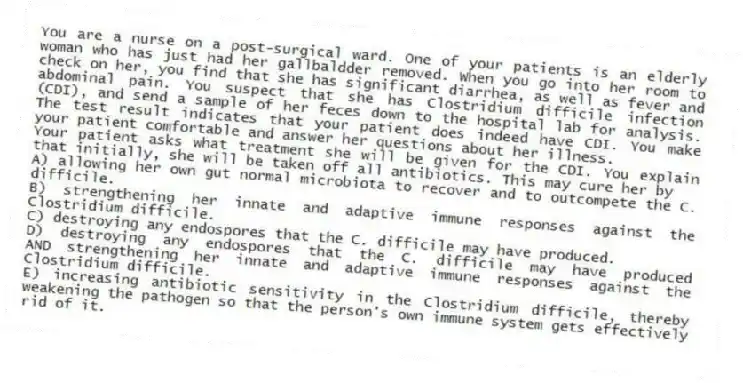
You are a nurse on a post-surgical ward. One of your patients is an elderly woman who has just had her gallbaldder removed. When you go into her room to check on her, you find that she has significant diarrhea, as well as fever and abdominal pain. You suspect that she has Clostridium difficile infection (CDI) , and send a sample of her feces down to the hospital lab for analysis. The test result indicates that your patient does indeed have CDI. You make your patient comfortable and answer her questions about her illness.
-Your patient asks what treatment she will be given for the CDI. You explain that initially, she will be taken off all antibiotics. This may cure her by
A) allowing her own gut normal microbiota to recover and to outcompete the C. difficile.
B) strengthening her innate and adaptive immune responses against the Clostridium difficile.
C) destroying any endospores that the C. difficile may have produced.
D) destroying any endospores that the C. difficile may have produced AND strengthening her innate and adaptive immune responses against the Clostridium difficile.
E) increasing antibiotic sensitivity in the Clostridium difficile, thereby weakening the pathogen so that the person's own immune system gets effectively rid of it.
Correct Answer:
Verified
Q80: Which of the following is specific to H.
Q81: Your brother is an enthusiatic hiker. He
Q82: You are a nurse on a post-surgical
Q83: Which of the following hepatitis viruses are
Q84: What are A/E lesions, produced by some
Q86: Which of the following type of hepatitis
Q87: Your brother is an enthusiatic hiker. He
Q88: Your brother is an enthusiatic hiker. He
Q89: Which of the following antigens are useful
Q90: You are a nurse on a post-surgical
Unlock this Answer For Free Now!
View this answer and more for free by performing one of the following actions

Scan the QR code to install the App and get 2 free unlocks

Unlock quizzes for free by uploading documents